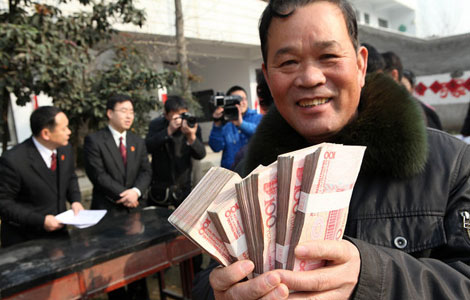China's postgraduate recruiters face dilemma
Updated: 2011-12-14 20:16
(Xinhua)
|
|||||||||||
BEIJING - After graduating from college this July, 24-year-old Zhang Chen did not find a job, but instead moved to Beijing to prepare for the national entrance exam for postgraduate education programs, which is scheduled for next month.
Zhang, like many of the 1.65 million registered applicants for this year's exam, did not perform well on his initial college entrance exam and ended up going to a mediocre college.
"The postgraduate exam will possibly be my last chance to enter Peking University," said Zhang. He previously took the exam in January and failed to pass.
Chances for Zhang and other students from lesser-known universities to enter postgraduate programs are becoming fewer, as more elite universities and research institutes prefer to recruit postgrads through independent exams or interviews. Many of their recruits come from their own undergraduate student population or from other top universities.
These universities believe that independent recruitment is a more efficient way to find qualified students, while those in opposition have argued that it has reduced the chances for those who choose to enter the programs by taking the national postgraduate exam.
Parallel recruitment
China has used a parallel system of postgraduate recruitment for decades, trying to strike a balance between offering equal opportunity for all candidates and prioritizing the most talented students.
A postgraduate school can recruit students through both the uniform national exam and independent selection among recommended candidates. The latter usually takes up a smaller proportion.
Over the past few years, the percentage of postgraduate students enrolled through independent selection has notably increased at top-level universities.
About 45.8 percent of postgraduate students at Peking University in 2011 were recruited through independent selection, up from 39.9 percent in 2009.
"We've received very positive feedback from professors. They say students who are recruited through independent selection have relatively better performance and stronger academic capability," said Zeng Jiaoli, an admissions officer at Shanghai-based Fudan University.
Through the independent selection process, universities can set their own criteria for testing candidates, giving them more flexibility, Zeng said.
However, the factors that come into play when it comes time to choose which students are qualified for independent selection have triggered controversy.
According to the Ministry of Education, only top-level universities can select independent selection candidates from their own undergraduates. These universities account for just 120 of the 856 universities that offer postgraduate programs nationwide.
Students from other universities, as well as those with working experience who wish to return to college, can only enter postgraduate programs through the national exam.
"If the universities go on increasing the quota for independent selection, fewer vacancies will be left to students like me," said Wang Meng, a student finishing her last year at a lower-ranking college in east China's Shandong province.
Rigid national exam
The increasing preference for independent selection has also revealed the weaknesses of the national postgraduate entrance exam.
The exam neglects discrepancies among universities, majors and students, resulting in exam-oriented education, said Lin Jie, an education expert at Beijing Normal University.
In 2005, Chen Danqing, a renowned painter, left his post at Tsinghua University. One of the reasons he cited for his departure was his belief that the rigid postgraduate entrance exam could not allow the school to select good students.
In his first year of teaching, five candidates for his postgraduate fine art program did not pass the national exam because they failed the English test.
The annual national exam takes 12 hours and covers a variety of subjects, including English, political knowledge and academics.
"I don't like the exam because it stresses one's ability to memorize over creativity and academic qualifications," said Zhang.
Giving more flexibility to universities would help them identify suitable students, Lin said.
"Equality is not the primary principle for postgraduate education, which is no longer compulsory," he said. "Selecting the best students is always the priority."
Education experts have suggested that the country should institute reforms for the national exam and tighten supervision over independent selection at major universities.
Hot Topics
HIV/AIDS, Egypt protest, Thanksgiving, climate change, global economic recovery, home prices, high-speed railways, school bus safety, Libya situation, Weekly photos
Editor's Picks

|

|

|

|

|

|







